
On Writing and Fatherhood: A Roundtable Discussion with Steven Church, Steve Almond, Dustin Parsons, and Ira Sukrungruang
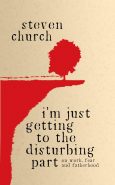
I’m Just Getting to the Disturbing Part: On Work, Fear, and Fatherhood
Nonfiction by Steven Church
Outpost 19, May 2018
$16.00, 196 pp.
ISBN-13: 978-1944853457
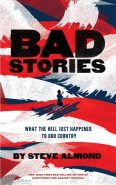
Bad Stories
Nonfiction by Steve Almond
Red Hen Press, March 2018
$16.95, 272 pp.
ISBN-13: 978-1597092265
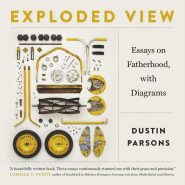
Exploded View: Essays on Fatherhood, with Diagrams
Nonfiction by Dustin Parsons
University of Georgia Press, March 2018
$24.95, 216 pp.
ISBN-13: 978-0820352879
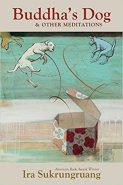
Buddha’s Dog & Other Meditations
Essays by Ira Sukrungruang
University of Tampa Press, March 2018
$16.00, 190 pp.
ISBN-13: 978-1597321563
At the heart of stories of fathers who are writers, at least some of the more well-known of these tales, you’ll often find abandonment, absence, substance abuse and other bad behavior. They are often stories of conflicted “bad” dads who somehow manage to make great art. The anti-heroes are the Faulkners, Cheevers, and Vonneguts of the writing world, fathers who perhaps ignored or rejected their children in the name of their writing, men who in succeeded in spite of their role as fathers rather than because of it; but I started thinking about all the writers I know who are also fathers and how none of them really seemed to fit this old model of the absentee artist father. I thought it would be interesting to have a discussion with a few of them about writing and parenting to see if perhaps there aren’t different stories today.
Part One: Children as Subjects, Devices, and Teachers
SC: Do you write about your children and/or about fatherhood? Why or why not? What risks and rewards have you found in doing so, or not doing so? What struggles?
DP: My whole first book is about fatherhood, both my own father and now my role parenting my two sons. I didn’t set out to do it, but I found as soon as we had two small children who had learned to walk and fall, I had little time to devote to longer pieces that meditated on deeper subjects. I could spend some time just working with one moment, finish a first draft in a sitting, and revise in a complete way multiple times each time I sat down at the computer. It changed my writing, and my wife’s writing. And at the time my first son was born I was experimenting with public domain images and how my own father had all these exploded view manuals in his shop that I would flip through constantly. These two subjects seemed destined to end up together.
SC: Sometimes I’m not sure how fathers or mothers DON’T write about their kids. But as my kids are getting older and their awareness and agency have grown and changed, my writing has definitely changed. My son, who is 16 now told me recently that he has to be “careful” around me because he never knows what might end up in an essay or a book. Oddly enough, he also seems OK with this. He’s not super embarrassed even when I read stuff about his toddler self to an audience, though he sometimes challenges me on the facts of what I remember.
SA: Ha! As well he should. One of the lessons that the children of writers learn early on is that writers offer up for public inspection a particular version of the story, and there’s a power to that. The kids become “characters,” their foibles and behaviors and precocious quips mined for laughs or pathos. It’s a vampiric arrangement, frankly. But parents are kind of vampires. So are kids. We’re feeding on each other in a million little ways. Sometimes that’s overt and even kind of ickily commodified. When my first daughter was born, for instance, I was asked to write a daddy blog for a website that sold lifestyle product to anxious moms and dads, part of the larger capitalist apparatus. So I wrote a bunch of shtick for them. I wasn’t trying to flatten out my daughter for mass consumption. I was trying to capture the roiling anxiety and adoration I felt toward her, in a more breezy way. I’m not ashamed of those pieces. But I also think they’re distinct from the deeper sort of work that you guys are talking about, writing in which our kids trigger a reckoning with our own doubts and fears and failures.
SC: My colleague likes to tease me by saying that my kids make good literary devices; and mostly I don’t deny that this is sometimes how they function in my writing. Is that so wrong?
DP: I guess I’ve never thought of my kids as literary devices—that seems so cold—and I don’t think that when I read your work, or the work of other fathers. Or mothers. There is often too much tenderness in even the most nightmarish memoirs to make me feel that including children in the manuscript is a simple “means to an end.” I’m thinking of the great essays from the late Brian Doyle, who could admit to yelling at his children, feeling that deep regret at what he’d done, but even in those most brutal moments I never suspected him of “using” them to get to something more. Maybe that’s the litmus test—when an essayist (or any writer) uses a character so obviously as a prop, we as readers can see right through it, and the work is callous, mechanical. It contains no duende. What I sometimes call “flat” in workshop. But I’d be curious to hear what you all think.
SC: Sure, I see what you’re saying, Dustin, and I guess it does sound a little cold and clinical, but perhaps the best interpretation of the comment about using my kids as “devices” is a commentary on my choice to include them. Because it is a choice I have to make and one I hope I’m not making simply as a means to an end but because they are, truly, at the emotional and intellectual center of so much of my work. My children have shown up in nearly all of my books and many of my essays, in part because they are little “essay engines,” that constantly force me to question and doubt myself and the larger world. Engine. Machine. Device?
IS: And like Dustin, “device” seems cold. My son’s presence in my life, my daughters, is less about them and more about what it means to be a father, or what it means to be human. Really, having kids has me spinning in every direction. In a good way.
I do remember teaching a graduate seminar about 8 years ago, during a time when I thought being a father was never in my future. I ran a discussion thread online about writing about families, posing the question about writing about your kids. It was funny to see how writers without kids responded versus ones with. One who was vehemently against kids said she would write about anyone and everyone without care. A mother in my class said children have no power, so we have to be wary how we write about our kids because our love for them, our protective instinct has to outweigh our professional lives. Then I would of been on the side on the student without kids. Now, I hedge very carefully into this new terrain of my life.
SA: The longer I raise kids, the more I’ve come to see that it’s really about bearing witness to their lives. Yeah, maybe helping them at certain points, but mostly watching and listening. The writer’s compulsion is to share what we’ve witnessed with the world. But I find that I’m so deeply enmeshed within the complex private world of these relationships that it doesn’t even occur to me to step back and write about them. I’m too busy absorbing them, I guess.
What I will do, often, is include my kids’ perspectives in my work. I do this because kids tend to cut right through all our delusions. They function as a kind of truth serum. When my daughter saw a football game for the first time, at age five, she asked, “Where are all the girl players?” Um. In the new book, I quote my son, who said this a few days after the 2016 election: “There must have been some really smart people who voted for Trump. What were they thinking?” There’s a sincerity to these questions, and a sense of bewilderment, which strikes me as the most honest and necessary response to the depravities of the adult world. It’s also the epistemological posture that serves writers best, essay writers in particular: we write not because there’s so much we know, but because there’s so much that baffles us.
IS: I’ve been a father to a son for about 19-months. So I’m the new father on the block. I’m a father to two girls from my wife’s prior marriage for three years. (Step-fathering is somewhat different.) The best way I can describe this change in my life is this way: Someone just gave me the thing I’ve always wanted–say it’s a remote controlled car. And the reason you wanted it was because it goes fast and it can jump over ditches and it would kick the crap out of Tommy W’s remote control car. The car is a symbol for substance. But when you receive this gift, when you open it up and see it for the first time, everything changes. It’s not about how fast or cool it is. It’s not about Tommy W, who was bully anyway. It is something deeper. A love for the mechanics of it, perhaps. A need that makes you want to know about what it means to possess such a prized item, to know the inner workings of it.
OK.
I’m not sure the metaphor is working. I know it isn’t. My kids aren’t remote controlled cars. But the thing is: Everything I’ve written since my son’s birth are in one way or another is about him. There is nothing in the 19-months of his life that he isn’t mentioned. I think the most surprising thing about being a father is that every facet of my life—I mean every facet of life—has been put to the test. I think about time differently. I think about violence differently. I think about loss differently. I think about loss all the time. And it’s not Steve’s son who is saying, “What were they thinking when they voted for Trump?” It was me, this new father of a bi-racial boy, and think WTF am I going to do?
SA: I forget the writer, maybe it was Kingsley Amis, who said, “Every child is a novel you don’t get to write.” That’s a pretty cold-hearted way to put it, one that ignores the ways in which being a parent deepens your insight and empathy. But it’s the same idea. And I do think the expectations have shifted. When I read about writers like Vonnegut, for instance, there was just a baseline assumption that he would spend many hours in his office doing his thing, while his wife dealt with his six kids. Same thing with Bellow. The artist and his work (patriarchal emphasis intended) came first. I know from reading Steven’s work, and visiting him, that he doesn’t do business that way. Nor do most dads who write these days. It’s not so much that we’ve “evolved,” which sounds both self-congratulatory and self-helpy. It’s more like we’ve started to get over our insane privilege. With less undivided attention, we’ve had to adapt.
Part Two: Balance, Magic, and Inspiration
SC: Some days while trying to balance work, fatherhood, family, and writing it is a miracle if I can sustain a line of thinking for more than a few minutes. So I thought I’d ask you guys, how do you balance your roles of Writer and Father? How do you find the mental space to make art? I guess I’m wondering here about practical stuff, things like time management, workflow, parenting tips, etc. How has fatherhood changed your writing process and product?
DP: Yeah, shorter pieces as I mentioned before. But I also find myself writing longhand more than I did before. The last essay I wrote was on the back of a receipt (one of those full-page receipts you get from dealerships, etc.) while I was waiting for my vehicle’s oil change. The material has changed. I write on anything handy, when before I could have sworn I needed a desk, notebook and/or computer, and quiet. I have dictated portions of a thing I’m working on in a text to my poor wife and sent it to her using the hands-free device in our car. Because she’s a writer, she sees this and doesn’t think there is something wrong with me, but knows to ignore it because I needed a record of what I was thinking.
I keep small pocket notebooks with me all the time, and I have so many, in a pocket of every coat and pant I regularly wear, that I sometimes can’t find something I jotted down while I was watching baseball practice, or was at the mechanics, or was making dinner. Somehow, they always reach me when I need them though. Just the other day I stumbled upon a note I wrote about “keeping fish” that my wife told me months ago. We were at a rest stop in Alabama, and I jotted down the idea and then never wore that coat again until just a week or so ago. Just when I was needing something new to work on. I looked in that pocket while I was taking my youngest boy to a dentist appointment and there it was, and while it isn’t done yet, it came to me just as I needed it.
I find that happening all the time, and it is mostly because I’m out in the world more now than I was before kids. I’d spend days with little contact besides my job and hanging out with my wife then, but now I have to come into contact with all sorts of people, all the time, that I’d never know if it weren’t for the boys. Tennis coach, allergist, parents of my kids’ friends. The exact thing I need seems to float to me in my writing as I’m writing it. And this is mostly because of being a busy parent with kids who are involved with lots of stuff. I write stories too, and the plethora of characters I see on a daily basis because of them has been a boon to my writing. Someone will do something, have some sort of a physical tick or habit that I’d never noticed in a person before, and I use it, sometimes consciously, sometimes not. I’m sure that’s nothing new to lots of writers, but I love that because I’m busy I have lots of inspiration out there. And magically, I seem to receive it just as it is needed.
SA: I envy you that magic, Dustin. I would not say it’s worked like that for me, though that’s a function of my own limitations, which existed long before my kids. Writing is an attention racket. That’s the crucial ingredient: sustained attention. It’s not that I have less sustained attention. It’s that I now devote a huge portion of that attention to relating to my kids, and to doing the sort of stuff you have to do to support a family—financially, domestically, emotionally. I do think all artists have to make that basic decision: how much attention goes into the work, how much goes into relationships?
I wish I had some great advice on time management, work flow, etc. I wish I knew what work flow was. But I’m a scattered mess most days, a person in search of an excuse to not write, because I find the process excruciating and doubt-choked. What I will say, as the dad of three young kids, is that you can’t make your family life the enemy of your creative life. They can’t be in competition. And the best way to avoid this, I’ve found, is for me to remind myself not to squander the hours I get in front of the keyboard. Because that will lead to me resenting my children and wife—rather than blaming the actual perpetrator: me. Identifying within yourself the need for “mental space” and communicating that to a partner, and even to the kids, is also hugely important.
I feel for Ira, and other writer parents whose kids are that young. Their needs are much more intense and immediate—and menial. And really, you don’t want to miss out on all the action. That’s what I keep reminding myself. Twenty or thirty years down the line (if I’m even around…gulp), am I going to be thinking about the book I was working on, or the little human beings who were raging through my house? They don’t give a shit how many books I write. They just want to know that I’m paying attention. What’s our real job on earth? How much are we here to nurture our kids and bear witness to their lives? How much are we here to write down what we witness, or imagine? The easy answer is that we should put the former in the service of the latter. Lots of great artists do. But most days I don’t. I don’t get as much done, or as deeply, as I did before I had kids. I hear them upstairs, tromping around the kitchen, and I want to see them, maybe make them some eggs or french toast. So I quit the keyboard, and whatever world I was in. Is that a sacrifice or an opportunity?
IS: That’s a complete opportunity in my book. I am so grateful for this life I’ve got. I know it sounds melodramatic, but it’s a good one for so many reasons. My wife works a 9-5 and was given only a couple weeks for maternity leave, which is horrendous. I have a job that afforded me months of paternal leave. This is a privilege—I know—and one I was going to take advantage of. I spent my days with him, learning him, him learning the world. I wrote some during the first few months, because as one my friends says, newborns are like little sleepy loaves of bread. But even then, even in sleep, he stole my attention from my writing. How could he not?
Now he’s in the toddler stage.
The other day as I was taking my son to swim class (which I’ve written about as the first father betrayal when I put him under the water for the first time and his look of shock and hurt) I picked the phone and used voice typing. I spoke a sentence and I spoke another sentence and another. I did not look over the sentences until I got home, but found bizarre things like: “Assland placard’s drove a river into the month.” So this is to say, I’m trying to figure this all out. And like Dustin I’m writing in short burst, shorter pieces, but oddly, if I’m being perfectly honest, I’m writing more. One of my former mentors, Lee K. Abbott, a father himself, said he tried to treat his other work—teaching at the university—as a 9-5 job. So he could dedicate his time to his writing and family. I’m trying to do that. To compartmentalize my time. Write when at school. Grade when at school. Be a father/husband/dog daddy when I’m home. I remember watching the J.D. Salinger documentary and thinking, he’s a horrendous father, how he’d disappear for days to write. Brilliant writer, sure. But I’d rather be a brilliant father.
DP: Maybe I just think it is magic, but it turns out that I’m flooded with so many scraps of things that it becomes, like a psychic reading a mark, easy to turn a vague and easily discernible happening into prognostication.
The big part for me was getting over the ritual of writing and just write. No set time. No set place. No set way of doing it. Once I did that, I found myself really becoming productive. But that took a few years, especially after the second child was born. Just a few days ago the boys wanted to go to the gym and play basketball, and I took them because even in Mississippi it is cold and miserable right now and they were suffering from an acute case of cabin fever. I played with them for a bit, and then they started playing with other kids, and I just faded back to the little aluminum stands next to the court and took out one of those notebooks and jotted down some stuff I’d been thinking about earlier that day. I was able to lose myself for that little bit of time, but I didn’t really think I was going to get that time. My wife was at a writer’s conference and she told me about what a few of her writer friends do when they have the urge to pull out their cell phones and look at them—instead they pull out a small notebook and draw, doodle, make silly, play on the page. What a great idea! So I’ve been trying that and it has changed things. It was easy to put away when the boys were done playing, but I got a little something out of that free time I had.
I also had to get over the idea that I had to be immersed in the book for hours at a time in order to do it well. I’ve gotten better and looking at the long game. A little bit now, a little bit later, and it adds up. A scene may take a week or two, but it gets done. I wasn’t patient as a young writer. Fatherhood helped me with that.
Part Three: Parenting in the Age of Trump
SC: Ok, so perhaps a bigger, tougher question: How do we, as writers and fathers, make art and parent in the current political and cultural environment? How do we parent children who might be marginalized or underestimated? And because we’re all fathers of sons, how do we make them better men? What, if any, is the role of writing and art in this?
SA: So one thing I just want to say in relation to this entire discussion (and it’s a bit of a tangent, but maybe a useful one) is that I bristle at the use of the noun “parent” as a verb. I don’t know why, exactly, but it feels weirdly and imprecisely bureaucratic and self-important. And it defines the act of caring for kids in a way that never lets them forget their inferior status. We are parenting; they are, uh … childing? It feels like some term that’s been handed to us by an industry rep, to make us feel that we have an official job description, one whose gravity will no doubt invoke the purchase of many ancillary products. The verbal use of “parent” feels especially discordant in the midst of this discussion, because I’m picking up from all the dads here that the process is a lot more mutual. Yeah, I’m looking out for my kids and making sure they’re safe and well-taught and blah-blah-blah. But what’s really happening, in most cases, is that we’re learning from each other. One of the joyful burdens of being a dad is that we’re remitted to the kingdom of childhood again, at least vicariously. We again get to view the world in a way that’s less sophisticated, but far more absorbent—emotionally, intellectually, and even morally.
Just as writers seeks to make readers see the world anew, kids are literally (and continuously) seeing the world anew. So I think it’s worth focusing on the ways in which I’m allowed to enter their world, as well as how they’ll deal with my (adult) world. I hear a lot of people worrying these days about the fate of our democracy. Heck, I just wrote a whole book on the subject. But I’ve actually found my children to be a source of great succor in this era of distress. Why? Because they are inherently hopeful and curious creatures. They’re not perfect. They’re often inconsiderate little shits. But their default setting is wonder, with occasional excursions into delight. And Jesus do we need more of that. My personal approach (along with my wife) has been to keep them the fuck away from screens. It’s not that they don’t watch stuff on our laptops. They do. But we don’t have TVs or ipads or any of that stuff. And the result has been that they read and play music and make forts. They do have a basic moral stance on the world, often quite a forceful one. But this arises from precepts of basic decency, which they get not just from us but from their teachers, friends, grandparents, etc.
I can’t speak to families in vulnerable communities. That’s a set of fears and anxieties that I’m privileged not to face. But my general sense is that we do best when we allow children to function as storytellers, when we shut up and listen and commune with them.
Joseph Conrad, so famous for peering into our heart of darkness, never lost his great faith in the act storytelling, and the pursuit of art more broadly. The artist, he insisted, “speaks to our capacity for delight, for wonder, to the sense of mystery surrounding our lives; to our sense of pity, and beauty, and pain; to the latent feeling of fellowship with all creation—and to the subtle but invincible conviction of solidarity in dreams, in joy, in sorrow, in aspirations, in illusions, in hope, in fear, which bind men to each other, which binds together all humanity—the dead to the living and the living to the unborn.”
IS: “How to make them better men?” Shit. That haunted me as soon as I learned my wife was pregnant. It continues to plague me. My son was born a couple weeks after the Pulse tragedy in Orlando, an hour away from us. I was petrified. I existed in a haze of doubt. How do I father this soon-to-be son in a world that seems—to me—about to implode. I love what Steve said about allowing our kids to function as storytellers. It’s so perfect. But my crisis, one I’m still working through now, is how do I tell the story of our world to my son when I, myself, see the crumble? His vision of the world, I think, will be a shared vision of how his parents see the world. His construction of story is part learning and part imitating. Isn’t it? Before my son was born, I read Scott Russell Sanders’ book Hunting for Hope: A Father’s Journey. In it, Sanders takes a road trip with his son and it is, at first, awful because of philosophical differences. Sanders had lost hope. His young son was hopeful. Sanders wrote: “Since I could not forget the wounds to people and planet, could not unlearn the dismal numbers—of pollution and population and poverty—that foretold catastrophe, I would have to look harder for antidotes, for medicines, for sources of hope.” So, to formulate this story for my son, where do I start? Last night, I was part of a storytelling event, much like The Moth in NYC, and I told a story about fathers. But it wasn’t a story. It was fragmented. It looped in on itself. It was a reflection of my brain that is in a constant spin about being a father the year my own passed away. Right there, on the stage, I had a realization. I don’t trust stories anymore. This is bleak, I know. What saves me is what Steve said about kids. My son is in a state of wonder and delight. That’s my light.
One of my students, John Williams, has a column about fatherhood on the Good Men Project and he recently wrote about being a better father in the Trump era. He sat down with his son and had “Talks that I never imagined I would be having or need to be having. Talks that I shouldn’t have needed to have.” In that is the true challenge as a father and writer living in this now. My writing, as soon as my son was born, has changed because everything I thought I believed is in this limbic state.
DP: I love this Ira, and I had such a specific moment happen just the other morning that really makes me think about “being a better father in the Trump era.” We have that damnable device Alexa in our house, and one of the first things my kids do in the morning is ask for the news and weather. NPR ends up being a pretty good morning listen most of the time. Like Steve, we don’t flip on the television or iPad in the morning, but this is one of our little pleasures, as we wake up, to listen to the news and then some music (today, it was Imagine Dragons which makes me question my success as a father). When the news came on today, as it has been for some time now, it was difficult stuff. I often find that we are having a full on discussion about politics and morality, before my coffee finds purchase, in which I’m explaining things about who Paul Ryan is and why does daddy cringe every time the name Stormy Daniels comes on. There were times during the Stormy Daniels story that I had to forgo the news altogether. The boys are 10 and 7—there are some things I just don’t yet know how to explain to them about what is going on. But of course they hear it anyway, and we end up talking about it too.
We’ve been talking together about things I never had access to when I was a kid. It isn’t my parents’ fault: they didn’t have the circus around to talk to me about. But I’ve felt closer to my boys than I do when we have to talk about things I would rather not.
I take Steve’s point about parenting as a verb—I totally understand how that creates a dynamic where we assert our superiority. Most of the time during these morning discussions I am having to relearn how to communicate about things of which I disapprove. And I need to be informed enough to do so. Sometimes parenting feels like a verb, like an action akin to athletic performance, where I have to do rather than let it happen. I can see why some people use it that way. But its use probably points to a problem with the basic way most people consider parenting to work—in a hierarchy. I imagine but have no evidence to think that this is where “helicopter parenting” comes from, for instance. The belief that kids have to be watched because any harm that comes to them, no matter how small, is not a learning moment, but instead an affront to their character. Those are the people who constantly suggest what they do is ‘parent’ instead of being a parent. When it is at its best, talking with my boys about things that are in the news feels more like being a parent than parenting. They are curious about all this, and though I totally infuse them with my own stance on things, their questions about what is happening in the world are genuine wonder and curiosity. That is so fun to engage with. I tell them what they don’t know, what they want to know, and they return the favor with this cool and interesting perspective that almost always gets lost in the bigger political views of the world.
When I write about the boys I’m almost always writing about an extraordinary time—a moment when what they did was memorable. But that is always “memorable to me.” Steven, when you mentioned “have we all had those experiences where our kids are doing something cool or creative or sublime and we’re thinking, ‘I’m totally going to write about this’” it triggered something in me—a realization—that I’m doing it subliminally. I want to believe that it doesn’t affect my actions (for example, would I have done this or that if I hadn’t thought it would make the potential future essay better? I shudder at the thought). But who is to say, subliminally, that it doesn’t? And all that has to do with the boys in relationship to me. It feels inherently selfish to use my memories of them for this not because it shouldn’t be chronicled, but because it might make me act differently in certain situations. But it also doesn’t stop me from using these memories and these moments. Do you know what I mean?
SC: I absolutely know what you mean, Dustin. I like to believe the mean-making, storytelling part of my brain makes me a better father and helps me tune into the wonder that both Steve and Ira have spoken about, helps me listen better to my children, but then I know of course that simply by observing the phenomena of their wonder-filled lives, by entering that “Kingdom of Childhood” we are inevitably and unconsciously changing their experience. I guess it’s that overlap of art and life that is both so thrilling and also kind of terrifying.
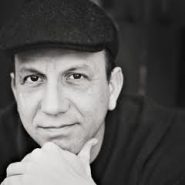
Steven Church is the author of six books of nonfiction, most recently I’m Just Getting to the Disturbing Part: On Work, Fear and Fatherhood, and One With the Tiger: Sublime and Violent Encounters Between Humans and Animals. He’s the Editor of The Spirit of Disruption: Selections from The Normal School and Series Editor for The Normal School Nonfiction Series from Outpost19. He coordinates the MFA Program in Creative Writing at Fresno State and teaches for the Low-Residency MFA Program at Sierra Nevada College.
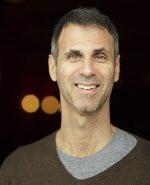
Steve Almond is the author of eight books of fiction and non-fiction, including the New York Times Bestsellers Candyfreak and Against Football. His short stories have been anthologized widely, in the Best American Short Stories, The Pushcart Prize, Best American Erotica, and Best American Mysteries series. His essays and reviews have appeared in the New York Times Magazine, the Boston Globe, the Washington Post, and elsewhere. He teaches at the Nieman Fellowship for Journalism at Harvard, and hosts the New York Times podcast “Dear Sugars” with fellow writer Cheryl Strayed.

Dustin Parsons is the author of Exploded View: Essays on Fatherhood, with Diagrams from University of Georgia Press. He is the winner of the Laurel Review Fiction Prize and the American Literary Review Fiction Prize as well as a New York Fine Arts and Ohio Arts Grant in nonfiction. He teaches at the University of Mississippi.

Ira Sukrungruang is the author of three nonfiction books Buddha’s Dog & other Meditations, Southside Buddhist and Talk Thai: The Adventures of Buddhist Boy, the short story collection The Melting Season, and the poetry collection In Thailand It Is Night. He is the recipient of the 2015 American Book Award, New York Foundation for the Arts Fellowship in Nonfiction Literature, an Arts and Letters Fellowship, and the Emerging Writer Fellowship. His work has appeared in many literary journals, including Post Road, The Sun, and Creative Nonfiction. He is one of the founding editors of Sweet: A Literary Confection (sweetlit.com), and teaches in the MFA program at University of South Florida. For more information about him, please visit: www.buddhistboy.com.

Leave a Reply